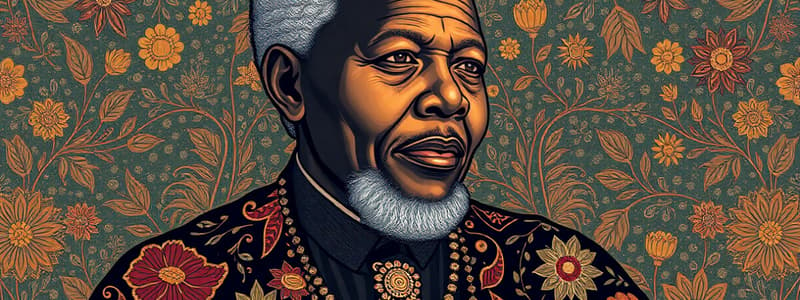Podcast
Questions and Answers
What is the highest manifestation of mental intelligence according to the content?
What is the highest manifestation of mental intelligence according to the content?
- Discipline
- Passion
- Vision (correct)
- Conscience
Which of the following best describes discipline as per the given content?
Which of the following best describes discipline as per the given content?
- The creative process of generating new ideas
- Sacrificing immediate pleasures for long-term goals (correct)
- The natural instinct to lead others
- A spontaneous reaction to challenges
What primarily fuels the drive to sustain discipline according to the chapter?
What primarily fuels the drive to sustain discipline according to the chapter?
- Indulgence
- Vision
- Passion (correct)
- Conscience
What aspect of intelligence is conscience associated with?
What aspect of intelligence is conscience associated with?
Which concept is in direct opposition to discipline as highlighted in the content?
Which concept is in direct opposition to discipline as highlighted in the content?
What three attributes are described as common among individuals who have had profound influence on society?
What three attributes are described as common among individuals who have had profound influence on society?
Which leader is noted for their vision of a new nation free from foreign interference?
Which leader is noted for their vision of a new nation free from foreign interference?
According to the content, what aspect does not represent the four intelligences necessary for effective leadership?
According to the content, what aspect does not represent the four intelligences necessary for effective leadership?
What significant quality does Nelson Mandela exemplify according to the discussion?
What significant quality does Nelson Mandela exemplify according to the discussion?
What is the correct sequence of outcomes as stated by Mother Teresa regarding the fruit of silence?
What is the correct sequence of outcomes as stated by Mother Teresa regarding the fruit of silence?
What differentiates leadership that endures from leadership that does not?
What differentiates leadership that endures from leadership that does not?
What did Adolf Hitler possess that ultimately did not contribute to enduring leadership?
What did Adolf Hitler possess that ultimately did not contribute to enduring leadership?
What is described as 'seeing a future state with the mind’s eye'?
What is described as 'seeing a future state with the mind’s eye'?
According to the content, what is necessary for creating a lasting change in the world?
According to the content, what is necessary for creating a lasting change in the world?
What realization did the grief-stricken woman come to after her husband's death?
What realization did the grief-stricken woman come to after her husband's death?
What is the primary purpose of developing a personal vision according to the content?
What is the primary purpose of developing a personal vision according to the content?
Which of the following statements best reflects the concept of 'affirming vision' described in the content?
Which of the following statements best reflects the concept of 'affirming vision' described in the content?
What role does discipline play in relation to vision as mentioned in the content?
What role does discipline play in relation to vision as mentioned in the content?
According to the content, why is it important to affirm teenagers during their identity crises?
According to the content, why is it important to affirm teenagers during their identity crises?
What implication does the statement 'Thee lift me and I’ll lift thee and we’ll ascend together' convey?
What implication does the statement 'Thee lift me and I’ll lift thee and we’ll ascend together' convey?
What is the relationship between discipline and freedom as suggested in the content?
What is the relationship between discipline and freedom as suggested in the content?
How do successful people differ from those who fail in terms of mindset?
How do successful people differ from those who fail in terms of mindset?
What aspect does passion contribute to an individual's life according to the content?
What aspect does passion contribute to an individual's life according to the content?
What does Aristotle suggest lies at the intersection of talents and societal needs?
What does Aristotle suggest lies at the intersection of talents and societal needs?
What is the primary difference between skills and talents?
What is the primary difference between skills and talents?
What is a common misconception about motivation in the workplace?
What is a common misconception about motivation in the workplace?
Which outcome is likely if an admirable end is achieved through an unworthy means?
Which outcome is likely if an admirable end is achieved through an unworthy means?
What does the phrase 'Happiness is a positive cash flow' imply in the context of discipline and purpose?
What does the phrase 'Happiness is a positive cash flow' imply in the context of discipline and purpose?
What does conscience provide according to the content?
What does conscience provide according to the content?
Why might individuals continue to do good even when faced with criticism?
Why might individuals continue to do good even when faced with criticism?
How does living by one’s conscience affect personal integrity?
How does living by one’s conscience affect personal integrity?
What lesson does the story about the nursing professor convey?
What lesson does the story about the nursing professor convey?
What does conscience represent according to the content?
What does conscience represent according to the content?
How does ego differ from conscience in terms of focus?
How does ego differ from conscience in terms of focus?
What is the role of sacrifice according to the content?
What is the role of sacrifice according to the content?
What common belief do major religious traditions share regarding moral sense?
What common belief do major religious traditions share regarding moral sense?
In what way does conscience respond to information compared to ego?
In what way does conscience respond to information compared to ego?
What does the content suggest about the inseparability of ends and means?
What does the content suggest about the inseparability of ends and means?
How is the power derived when one engages with work that aligns with personal values?
How is the power derived when one engages with work that aligns with personal values?
What does the content imply about the nature of conscience in relation to culture?
What does the content imply about the nature of conscience in relation to culture?
Which statement correctly contrasts ego and conscience?
Which statement correctly contrasts ego and conscience?
Study Notes
Four Intelligences
- Vision, discipline, passion, and conscience are the four essential intelligences
- These intelligences are our highest means of expressing our voice
- Vision is seeing with the mind's eye what is possible. It results when our mind joins need with possibility.
- Discipline is paying the price to bring that vision into reality. It arises when vision joins with commitment.
- Passion is the fire, the desire, the strength of conviction. It arises when human need overlaps unique human talent.
- Conscience is the inward moral sense of what is right and what is wrong.
Vision
- All things are created twice: first, a mental creation; second, a physical creation.
- Memory is past. It is finite. Vision is future. It is infinite.
- Vision is about discovering and expanding our view of others, affirming them, believing in them, and helping them discover and realize their potential.
- Viewing people separately from their behavior affirms their fundamental, unconditional worth.
Discipline
- Discipline represents the second creation. It is the executing, the making it happen, the sacrifice entailed in doing whatever it takes to realize the vision.
- Discipline is willpower embodied.
- Leadership is the capacity to translate vision into reality.
Vision, Discipline, and Passion in Leadership
- Leaders who have had a profound influence on others, on institutions or on society possessed three common attributes: vision, discipline and passion.
- George Washington had the vision of building a new nation, united and free from foreign interference. He disciplined himself to learn how to recruit, supply and keep people from deserting the Revolutionary Army. He was passionate about the cause of liberty.
- Florence Nightingale was passionate about improving the quality of nursing in military hospitals.
- Mohandas K. Gandhi was instrumental in establishing India as an independent state though he never held an elected or appointed office. His moral authority created such strong social and cultural norms that it ultimately shaped political will.
- Margaret Thatcher was passionate about urging people to assume the discipline of personal responsibility and to build self-reliance, and she was passionate about bolstering free enterprise in her country.
- Nelson Mandela was impelled by his imagination rather than by his memory. Deep within his soul resonated a belief in the worth of every South African citizen.
- Mother Teresa dedicated herself wholeheartedly, freely and unconditionally to the service of the poor.
- Adolf Hitler passionately communicated his vision of a thousand-year reign of the Third Reich and of a superior Aryan race. He built one of the most disciplined military-industrial machines that the world has ever seen. He evidenced brilliant emotional intelligence in his impassioned oratory, inspiring in the masses almost fanatical dedication and fear, which he channeled into hate and destruction.
Conscience
- When conscience governs vision, discipline and passion, leadership endures and changes the world for good.
- When conscience does not govern vision, discipline and passion, leadership does not endure, nor do the institutions created by that leadership endure.
- Hitler had vision, discipline and passion but was driven by ego. Lack of conscience was his downfall.
- Gandhi’s vision, discipline and passion were driven by conscience, and he became a servant to the cause and the people.
- When vision, discipline and passion are governed by formal authority void of conscience or moral authority, it also changes the world, but not for good, rather for evil. Instead of lifting, it destroys; rather than lasting, it is eventually extinguished.
The Importance of Affirmation
- Seeing people through the lens of their potential and their best actions, rather than through the lens of their current behavior or weaknesses, generates positive energy and reaches out and embraces others.
- Cultivating the habit of affirming people, of frequently and sincerely communicating your belief in them is supremely important.### Discipline
- Discipline is the ability to subordinate present desires for future goals
- Discipline is not the absence of freedom but the key to true freedom
- The undisciplined are slaves to their moods, appetites and passions
- Discipline comes from being devoted to something greater than yourself
- Success requires discipline, the ability to do what others won't
- Lack of discipline leads to procrastination and a focus on excuses
Passion
- Passion arises from your heart and fuels your optimism, excitement, determination, and drive
- Passion is a result of choice not circumstance, a belief that you control your future
- Passion is your vocation, the intersection of your talents with the world's needs
- Passion arises from knowing yourself, your talents, and your purpose in the world
- Finding your passion involves self-reflection and answering the call of your true self
Conscience
- Conscience is the inner moral compass, a sense of right and wrong that transcends cultures
- Conscience is a universal phenomenon, independent of religion, culture, or nationality
- Conscience is a quiet and peaceful voice, while ego is tyrannical and self-serving
- Conscience is the voice of God for some and an innate sense of fairness and justice for others
- Conscience elevates ego to see beyond self-interest and consider the greater good
Conscience and Ego
- Ego focuses on self-preservation and is threatened by negative feedback
- Conscience values feedback and seeks truth, open to reality in all its forms
- Ego is myopic, while conscience is aware of the entire system and environment
- Ego limits one's capacity and is concerned with control, while conscience empowers
- Conscience teaches that ends and means are inseparable, while ego believes the ends justify the means
The Importance of Conscience
- Conscience emphasizes the inseparable nature of ends and means
- Unprincipled means lead to undesirable unintended consequences
- Wisdom involves pursuing the best ends through the best means
- Conscience guides vision, discipline, passion, and moves individuals toward interdependence
- Conscience transforms passion into compassion, genuine care for others
Integrity
- Living by conscience produces integrity and peace of mind
- Integrity allows individuals to be both kind and courageous in their interactions
- Integrity can lead to synergy, where the whole is greater than the sum of its parts
- Individuals who lack conscience will find their ego controlling their relationships
- The private victory of integrity is the foundation for achieving public victories
Stone: A Real-Life Example
- Stone, a former Ugandan soccer player, embraced his conscience after a career-ending injury
- Stone used his vision and conscience to guide young Ugandan boys and teenagers
- Stone embraced discipline and sacrifice to inspire others
- Stone's passion empowered young people to find self-mastery and contribute to their communities
- Stone's work demonstrates the transformative power of conscience for individuals and society
Finding Your Voice
- The text emphasizes the importance of finding one's voice, which is the intersection of talent, passion, need, and conscience.
- The author argues that engaging in work that aligns with all four dimensions leads to a fulfilling and impactful life.
- The four dimensions of voice are paralleled by the four personal leadership attributes: vision, discipline, passion, and conscience.
- The text highlights the story of Muhammad Yunus as an example of finding one's voice.
- The author assures readers that applying these four capacities in any life role can help them find their voice.
- The text challenges readers to analyze their primary life roles by asking four questions:
- What need do I sense?
- Do I possess a talent that can meet the need?
- Does meeting the need tap into my passion?
- Does my conscience inspire me to take action?
- The author encourages readers to develop a plan of action and commit to it to find their true voice.
Finding Your Voice: Applying It to Life Challenges
- The text explores the application of finding your voice to various personal challenges, such as losing weight, getting a job, and achieving life balance.
Losing Weight
- Achieving physical health and fitness is the vision.
- Discipline entails a regimen of exercise, nutrition, rest, and stress management.
- Deep emotional commitment and drive represent passion.
- The reason behind getting healthier, such as living longer or providing for family, is driven by conscience.
- The text emphasizes the importance of intrinsic motivation beyond superficial reasons like vanity or external pressure.
- The author draws on the experience of a friend who found motivation to prioritize his health by seeing the impact on his legacy for his children.
Getting a Job
- The text emphasizes that getting the desired job involves a highly interdependent effort and requires effective influence with others.
- To find the right job, it's necessary to understand the job's specific requirements, the organization, the market forces, and the challenges the organization faces.
- Finding a job that aligns with your talent, interests, and skills reflects passion.
- Conscience dictates whether the job is worthy of commitment.
- The text encourages readers to differentiate themselves as a solution to the decision-maker's problems, showcasing passion and commitment.
Achieving Life Balance
- The text addresses the challenge of life balance caused by focusing on work and commitments at the expense of treasured relationships and activities.
- The author uses the story of a man who successfully balanced his busy life with time dedicated to his mother.
- This story showcases the importance of analyzing priorities (vision, passion, conscience) and creatively structuring one's life (discipline) to achieve harmony.
- The story highlights the positive impact of a supportive spouse who shares the vision and helps implement solutions.
- The text emphasizes the power of consistent communication in maintaining and strengthening relationships.
- The author draws on his personal experience of daily phone calls with his mother, which fostered a deep connection despite physical distance.
- The text suggests that family is the highest form of achieving life balance, offering the greatest opportunity for both personal growth and contribution to society.
- The author quotes David O. McKay, stating that the most important work is within the walls of one's own home, emphasizing the importance of family leadership.
- The text concludes by highlighting the significant consequences of applying vision, discipline, passion, and conscience to life choices.
Leadership in Family Culture
- Future generations may be amazed and saddened by the impact of small changes.
- A challenging test of leadership is for parents to establish a vision for their family, demonstrate discipline and sacrifice, and persevere through hardship with passion, drive, and commitment, all guided by conscience.
- The ultimate fulfillment and joy may come from transmitting this family culture across generations.
- Success in other areas may be insufficient compensation for failing to cultivate this intergenerational legacy.
- John Greenleaf Whittier highlights the sadness of "It might have been!" suggesting the potential for unfulfilled aspirations.
- However, the opportunity to become what we could have been is always present.
Studying That Suits You
Use AI to generate personalized quizzes and flashcards to suit your learning preferences.
Description
Test your understanding of key concepts related to leadership, discipline, and intelligence. This quiz covers important figures and their philosophies, along with the traits necessary for impactful leadership. Challenge yourself to identify the nuances of mental intelligence and the attributes that drive effective guidance.



